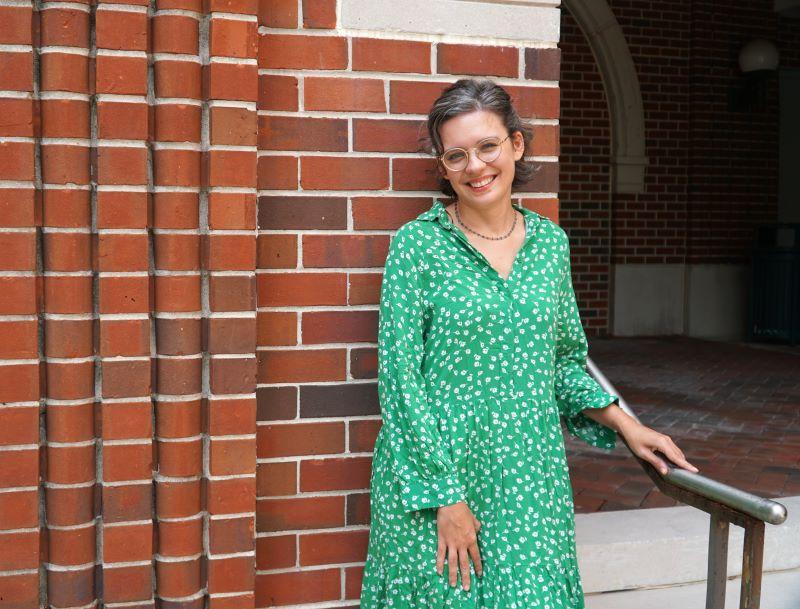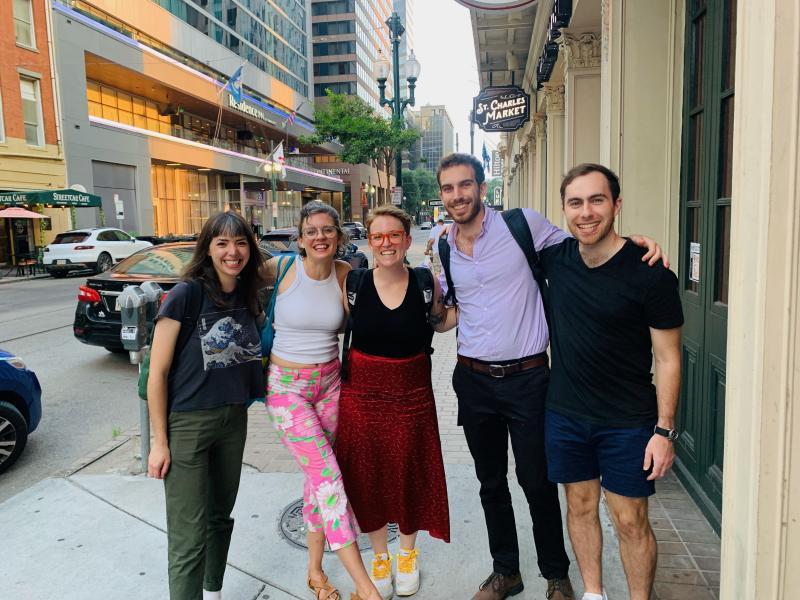Law student committed to 'life of service' in public interest law
Earlier this fall, Erika Hodges, a second-year Tulane Law student, spoke to rising first-years, explaining their reasons for diving into public interest law.
“When I was growing up, if I had been in trouble, I would have needed the help of a public defender,” they recounted matter-of-factly. “My choice is guided by the fact that there are so many people like me and my family who would have no other way to be represented.”
Hodges, the president of Tulane’s Public Interest Law Foundation (PILF), has faced more personal hardships to reach law school than most. In fact, just going to college – they are a first-generation college student – was nothing short of a miracle. Their life experiences and journey through law school have made them deeply committed to helping the marginalized and giving them access to legal representation.
“PILF has been such a personal project for me to take on,” said Hodges. “Helping students secure funding so they can work in the public interest legal field is something I am honored to facilitate."
Hodges is just one example of why the Tulane PILF each year runs annual fundraising campaigns to boost the funding for students to work summer jobs – often unpaid – in public defenders’ offices, nonprofits, and other agencies that serve the poor. PILF's next fundraiser is in March, and money will go for summer grants to students, supplementing their income or as their only source of income.
While the annual PILF fundraiser is a part of how students with public interest summer jobs are financially supported, it is not the only way. And this year changes were made to the financial structure to provide more support for students.
“Historically our PILF students held the PILF auction and raised money in other ways to supplement the summer stipends for our public interest students,” said Interim Dean Sally Richardson. “But that process put so much onus and pressure on students and led to a lack of certainty as to the amount of summer stipends. So we redid the budgeting and took the position that it should be on the law school, not the students, to provide this support for those pursuing public interest summer jobs. And it is an excellent way that law firms and alums can support a student or students over the summer.”
Hodges is a great example of the type of student who was supported by the PILF summer stipends. This past summer, Hodges worked at the Orleans Public Defenders Office.
Hodges’ drive to help their community began as a youth. By the age of 16, their family had moved six times. Twice before they graduated from high school, the family home went into foreclosure, and they lost many possessions. Hodges’ home life was rife with effects of generational trauma and mental illness, they said.
“It was an incredible feeling of hopelessness,” Hodges recalled.
Hodges moved in with an older sister and worked to support themselves, all the while trying to finish high school. By the time senior year rolled around, college wasn’t an option and Hodges was barely navigating the chaos of life.
“My college counselors didn’t even mention ACT or SAT,” Hodges said. “So I figured I’d just get a job. I graduated, and I did a lot of hanging out, working crappy jobs and dealing with crappy boyfriends.”
Years went by and at age 22, Hodges knew something had to change. Their dad, who was increasingly ill at the time, encouraged them to go to college. They found a home at Naropa University, a liberal arts college in Colorado known as the birthplace of the mindfulness movement. Its non-traditional, Eastern-inspired educational structure worked well for Hodges, and they earned a bachelor's in writing and literature.
“It was a whole new life for me,” Hodges said. “ I felt heard and I met people who thought I had something to offer and I loved it.”
After Naropa, Hodges became more free-spirited than ever – moving to New York to be an artist and making illuminated art – massive sculptures and installations all over the city. They also received a master’s degree from Pratt Institute in Brooklyn.
It was then that the pandemic hit. Hodges was evicted, and they were forced to move across the country, where they watched from a place of helplessness while their friends and community suffered abuse at the hands of the police in the summer of 2020.
This was not the first time they encountered systemic injustice, but it was a breaking point for Hodges. They needed a way to help the people they cared about most, no matter the circumstance.
with the Orleans Public Defenders Office.
“I thought, what can I do to not feel powerless ever again?” Hodges said.
Law school was the answer. They studied for the LSAT and scored well enough to gain a scholarship, and after applying to more than 22 schools, chose Tulane Law because they were drawn to New Orleans, a place they felt they could find a community and be of service to that community.
Choosing law school was a meaningful way of working for change, “to show that things don’t have to be like this,” Hodges said.
At Tulane, Hodges is thriving. From Evidence Professor Jancy Hoeffel, Hodges has learned “exactly who I want to be” as a lawyer; and from Professor Stas Moroz, she gained legal experience as a student research assistant. Today, Hodges said her professors are “part of my community, and that would not be possible in other schools.”
Hodges’ guidepost remains the same.
“I’ve watched my community struggle and the only solution I have found is that I have to be of service,” Hodges said. “That to me is healing – for me and for others.”


